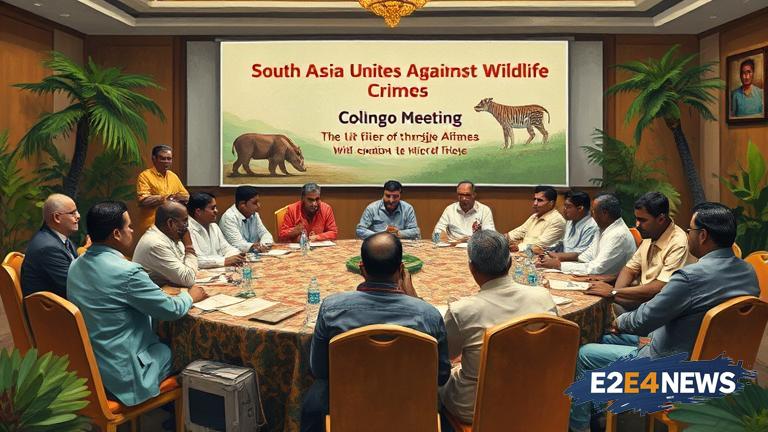In a groundbreaking move, South Asian nations converged in Colombo, Sri Lanka, to address the pressing issue of crimes against wildlife. The landmark meeting brought together representatives from various countries in the region, including India, Pakistan, Bangladesh, Nepal, Bhutan, and the Maldives. The primary objective of the gathering was to strengthen regional cooperation and develop a unified strategy to combat wildlife trafficking and related crimes. The meeting was attended by high-ranking officials, including ministers, secretaries, and directors of wildlife departments, as well as experts from international organizations. The participants engaged in intense discussions, sharing their experiences and best practices in combating wildlife crimes. They also explored ways to enhance collaboration and information sharing among law enforcement agencies, customs, and other stakeholders. The meeting highlighted the gravity of wildlife crimes in the region, which has become a major hub for wildlife trafficking. The illicit trade in wildlife products, including rhino horns, elephant tusks, and pangolin scales, has led to significant declines in wildlife populations, threatening the very survival of many species. The meeting emphasized the need for a coordinated approach to tackle these crimes, which often involve organized crime syndicates and corrupt officials. The participants agreed to establish a regional task force to share intelligence, coordinate investigations, and conduct joint operations against wildlife traffickers. They also pledged to strengthen laws and regulations, improve enforcement, and enhance public awareness about the importance of conservation. The meeting was hailed as a major success, marking a significant milestone in regional cooperation against wildlife crimes. The participants expressed their commitment to working together to protect the region’s rich biodiversity and combat the scourge of wildlife trafficking. The meeting also highlighted the importance of engaging local communities in conservation efforts and providing them with economic benefits and incentives to protect wildlife. The participants recognized that wildlife conservation is not just a moral imperative, but also an economic necessity, as it can generate significant revenue and create jobs. The meeting concluded with a call to action, urging all stakeholders to work together to protect the region’s wildlife and combat crimes against them. The participants also agreed to meet regularly to review progress, share best practices, and coordinate their efforts. The meeting was organized by the Sri Lankan government, in collaboration with international organizations, including the Convention on International Trade in Endangered Species of Wild Fauna and Flora (CITES) and the International Union for Conservation of Nature (IUCN). The meeting was funded by the Global Environment Facility (GEF) and the United Nations Development Programme (UNDP). The meeting’s outcome is expected to have a significant impact on the region’s wildlife conservation efforts, and it is hoped that it will inspire other regions to follow suit. The meeting’s success demonstrates that regional cooperation and collaboration can be an effective way to tackle transnational crimes, including wildlife trafficking. The meeting also highlights the importance of international cooperation and the need for a global response to combat wildlife crimes, which are often driven by demand from countries outside the region. In conclusion, the Colombo meeting marks a significant step forward in the fight against wildlife crimes in South Asia, and it is hoped that it will lead to a major reduction in wildlife trafficking and related crimes in the region.





